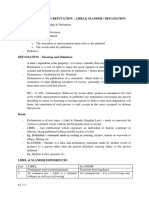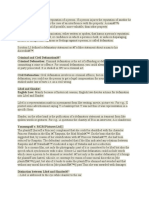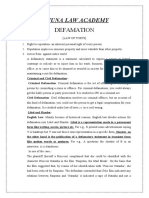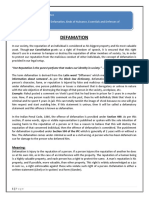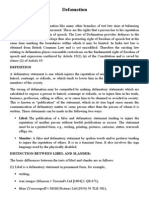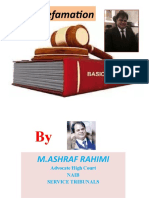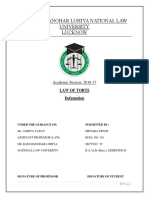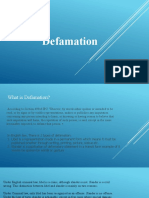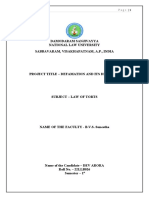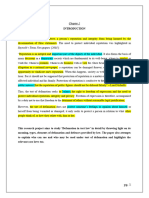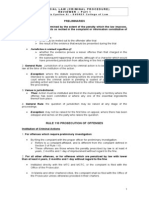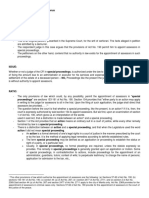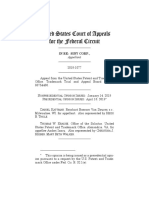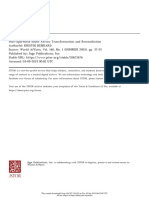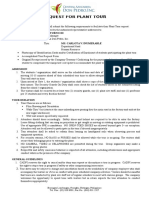Page |1
“Balance between one person’s right to freedom of speech and another’s right to protect
their good name.”
Any intentional false communication, either written or spoken , that harms a person’s
reputation; decreases the respect, regard or confidence in which a person is held; or induces
disparaging, hostile or disagreeable opinions or feelings against a person is known as
defamation.
Defamation is the act of making untrue statements about another which damages his/her
reputation.
Defamation is of two kinds Libel and Slander. If the statement is made in writing and
published in some permanent and visible form, then the defamation is called libel. Whereas,
if the statement is made by some spoken words then the defamation is called slander.
Mainly because of historical reasons, English law divides actions for defamation into Libel and
Slander. Libel is a representation made in a permanent form like writing, movie, picture etc. For
e.g., X printed some advertisement saying Y is bankrupt but Y was not thus it was representation
in a specific form. Slander, on the other hand is the publication of a defamatory statement in
transient form like spoken words or gestures. For e.g., A questions the chastity of B in an
interview, A is slanderous.
In Youssoupoff v. MGM Pictures Ltd.2 the plaintiff (herself a Princess) complained that she could
be identified with the character Princess Natasha in the film ‘Rasputin, the Mad Monk’. On the
basis that the film suggested that, by reason of her identification with ‘Princess Natasha’, she
had been seduced by Rasputin. The defendant contended that if the film indicated any relations
between Rasputin and ‘Natasha’ it indicated a rape of Natasha and not a seduction. Held- In a
cinema film, not only the photographic part of it is considered to be libel but also the speech
which synchronizes with it also. Defamation could include words which cause a person to be
shunned or avoided: ‘not only is the matter defamatory if it brings the plaintiff into hatred,
ridicule, or contempt by reason of some moral discredit on [the plaintiff’s] part, but also if it
tends to make the plaintiff be shunned and avoided and that without any moral discredit on [the
plaintiff’s] part. Thus, she was awarded with damages.
Distinction between Libel and Slander
Libel is addressed to the eye while slander to the ear. - -In English Criminal law, only libel has
been recognized as an offence, slander is no offence. -In Indian law, both are criminal offences
under Section 499 and 500 of IPC. Under law of torts, slander is actionable and libel is actionable
per se.
Defamation may be a civil charge or a criminal charge under Section 499 and 500 of IPC.
Section 499 Of IPC:- Whoever by words either spoken or intended to be read, or by signs or
by visible representations, makes or publishes any imputation concerning any person
intending to harm, or knowing or having reason to believe that such imputation will harm,
the reputation of such person is said to defame that person.
Section 500 of IPC:- Whoever defames another shall be punished with simple imprisonment
for a term which may extend to two years or with fine or both.
[1]
� Page |2
There must be a statement which can be spoken, written, pictured or even gestured.
Exceptions
For a statement to be published, a third party must have seen, heard or read the
defamatory statement. If there is no publication there is no injury of reputation and no
action will arise.
The above statement must have caused an injury to the subject of the statement. It means
that the statement must tend to injure the reputation of a person to whom it refers.
The defamatory statement must be false. If the statement is not false then the statement
will not be considered as defamatory statement.
In order for a statement to be defamatory, it must be unprivileged. There are certain
circumstances, under which a person cannot sue someone for defamation.
Defences available under Defamation
Justification of truth-
If the defendant proves that the defamatory statement is true, no action will lie for it, even
if the statement is published maliciously. It is not necessary to prove that the statement is
literally true, it is sufficient if it is true in substance.
2) Fair and bonafide comment-
A fair and bonafide comment on a matter of public interest is a defence in an action for
defamation. The essentials of a fair comment are:
(i) That it is comment or criticism and not a statement of fact,
(ii) That the comment is on a matter of public interest,
(iii) That the comment is fair and honest.
3) Privileged statement-
Law makers have decided that one cannot sue for defamation in certain instances when a
statement is considered privileged. Whether a statement is privileged or unprivileged is
policy decision that rests on the shoulders of the lawmakers.
[2]
